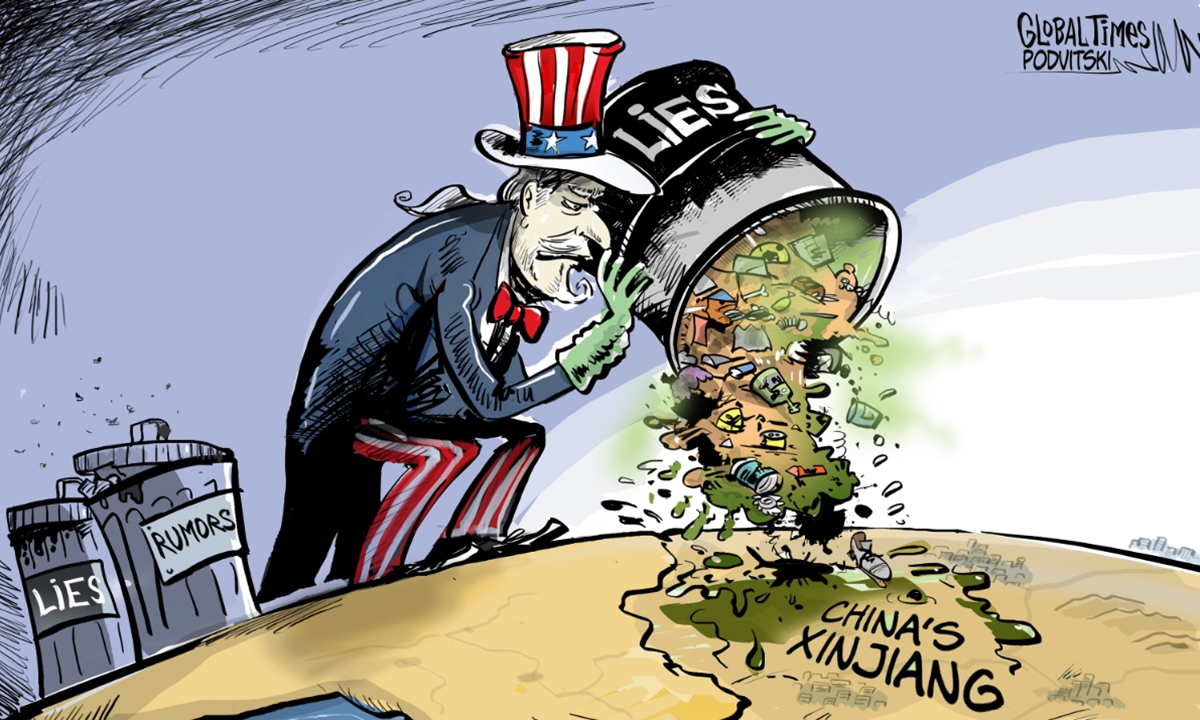With a habit to slander China based on lies, hearsay, what credibility do Western human rights organizations have?

Slandering Xinjiang -- the new normal of the "empire of lies" Illustration: Vitaly Podvitski
If a country has lifted nearly 100 million people out of poverty, has over 1 billion internet users, provides its people with the safe social living environment and convenient infrastructure, then what reason is there to say that this country is "trampling on human rights?"
However, in the eyes of some Western forces and so-called international human rights organizations, China, which has achieved the above accomplishments, is still their target for criticism. They make a big deal out of issues related to Xinjiang, Xizang (Tibet), Hong Kong and other affairs, with obvious political motives aimed at intensifying China's ethnic conflicts and dividing the country's territory, despite that many people have acknowledged that China's breakthroughs and contributions in the human rights field have been remarkable, providing an effective reference template for other developing countries. Here, we need to note that the UN Human Rights Council has adopted the resolution on "The contribution of development to the enjoyment of all human rights" advocated by China, leaving a significant mark in the history of human rights worldwide.
In reality, China has long used truth and facts to repeatedly embarrass these Western anti-China forces. For example, regarding the Xinjiang issue, the State Council Information Office of China released a white paper on Xinjiang's demographic development on September 26, 2021, detailing the demographic development in Xinjiang Uygur Autonomous Region with data and slamming groundless fabrications against Xinjiang such as "forced labor," "forced sterilization," "parent-child separation," "cultural genocide" and "religious persecution."
As the saying goes, "seeing is believing." Chinese Foreign Ministry spokesperson Hua Chunying once stated that China welcomes all unbiased people to visit Xinjiang. In 2022, foreign ambassadors and senior diplomats from countries such as Yemen, Iraq, Algeria and Guinea-Bissau visited local mosques, communities and businesses in Xinjiang, gaining a deep understanding of the real situation of the region and enthusiastically shared what they saw and heard in mainstream media.
Overseas media and scholars have also spoken out on the Xinjiang issue. For example, US news website "Grayzone" exposed a certain anti-China pseudo-scholar's lies about "ethnic genocide" in Xinjiang; French writer Maxime Vivas has proved that all rumors related to Xinjiang are false with what he experienced in the region during two trips.
Now, let's take a look at Hong Kong. Data shows that in 2020, the amount of funds flowing into Hong Kong reached $50 billion, the city was ranked as the second largest IPO market in the world, and Hong Kong's economy expanded by 7.9 percent in the first three months of 2021. An IMF report published in 2021 affirmed Hong Kong's position as a major international financial center and Moody's Analytics forecast Hong Kong's 2023 gross domestic product growth at 4 percent. All of this is a vote of confidence in the national security law for Hong Kong and the city's development prospects.
Non-governmental organizations are inherently political. In fact, take the Amnesty International as an example, its annual report fiercely criticizes China's human rights record every year. However, upon reading Amnesty International's annual human rights reports, it's clear that the objectivity, impartiality and truthfulness of these reports are questionable.
Amnesty International has long held political bias against China, and its annual human rights report has always been based on the overall denial of China's human rights work as its main theme. With biased understanding, it tries its best to label China as "authoritarian" and "absent of human rights," ignoring China's overall progress in the rule of law and human rights development.
On the one hand, these anti-China organizations claim that they "seek the truth" and "maintain objectivity and neutrality," but on the other hand, they unconditionally believe the one-sided statements by individuals hiding in the dark, even buying poorly fabricated lies and openly ignoring the Chinese government's upright and positive response. They also ignore the fair voices of objective international organizations, media, and people.
For example, in the face of the riots in Hong Kong in 2019, these anti-China organizations ignored the fact that public safety and order in Hong Kong was greatly disrupted, only focusing on the rights of violent criminals and ignoring the rights of most innocent people. Their double standards are disgusting.
These anti-China organizations seem to be accustomed to prioritizing their political stance, disregarding facts, and portraying themselves as the only "saviors." This is kind of self-entertainment. They selectively screen information based on their preferences and biases, and select "human rights defenders" according to their own standards while downplaying criminal behavior. They make it a habit to denounce and slander, and even resort to hearsay and fabrication of facts. How fair and just can their reports be?
These organizations use human rights as a fig leaf to rudely interfere in the internal affairs of sovereign countries, with sinister intentions known to all. They have faced oppositions and resistance from many countries, including China. One cannot stand in the world without honesty and trustworthiness. Wise people can easily see through their sinister nature without the need for further explanation.
The author is a reporter with Global Times. opinion@globaltimes.com.cn

